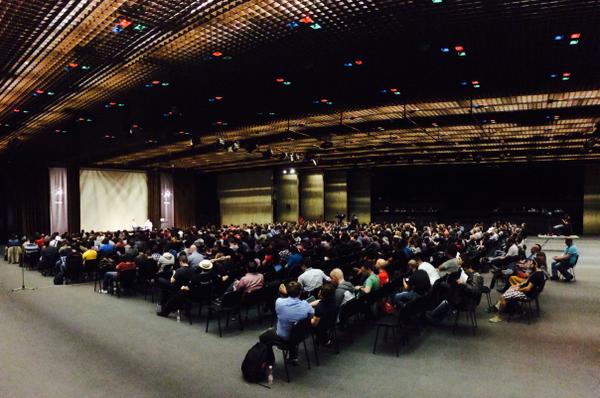I’m at WordCamp Europe in Sofia - taking rough notes on some of the talks
Matt Mullenweg, Om Malik http://2014.europe.wordcamp.org/session/matt-mullenweg/

In conversation with Om Malik:
- Biggest learning in the last 11 years?
- The community makes it what it is - not the feature set. Lots of other software checks the same boxes that WordPress checks, but it doesn’t have what we have in this room
- For-profits have a limit in their vision. Non-profits have difficulty making connections with enough/the right people. Working together they can achieve more.
- “I’d rather put things into the world under moral licences than immoral ones” - GPL is the “Most moral licence” that you can put software out under
- “I’d be skeptical of an open source company that kept everyone in the same office” - that’s missing part of the benefit: Open source works when people are all around the world.
- How do we structure WP so that it can adapt to what the trends are over the coming years?
- more and more access is on closed proprietary devices (iphones etc.)
- Wp wasn’t designed with touch interaction in mind. WP apps haven’t had a ton of community involvement

Photo by @Joan_Artes
Q&A
- What are your thoughts about entrepreneurship in Europe, particularly eastern europe?
- @om - Local laws in Europe favour local investors over international investors: a challenge for entrepreneurship
- “The best thing European companies can do is to stop comparing themselves to American companies”
- CFTP Wheatley: “You’ve scaled up 1800 people - what do those people actually do”
- Lots on support
- Design and development: allows us to contribute much much more to WP Core
- “I want to scale that as far as it can go”
- Wants it to be an exemplar of a mixed nonprofit/for profit: prove to the world that it Can be done.
- Once we have APIs it will enable a whole new class of application - e.g. front-ends which talk to something which isn’t WP but implements the WP API.
- A Cambrian explosion for WordPress - comparable to when plugins were introduced
- “We’ve found the search in WP isn’t very good”
- “No it’s terrible”
- If you’re serious about search you should use a plugin that indexes your content in lucene or elasticsearch
- No plans now or in the future to have paid plugins - or a paid app store.
- Could make things more discoverable: look at what you’ve got installed and suggest things you might find useful
- This year there were more non-english downloads than english downloads
- More translations will be the biggest driver of increases in WP usage
- How much should WP businesses be contributing to the WP community?
- Maybe 5%, so if you have 100 employees, 5 of them could be contributing to core.
- Can we get rid of Backwards compatibility
- I don’t buy that we should break backwards compatibility for architectural purity. More inclined to do it for reasons that will mean more people use WP
- Lots of plugins aren’t maintained - some maintainers may even have died. Can we get these just removed from the directory?
- Plugins over 2 years old will stop showing up in search results
- Plugin search is going to be optimised towards putting the most popular, best supported ones at the top.
- Factor in the compatibility between plugins - plugins which work well together
- Plugins are the most open area for innovation - it’s an open market